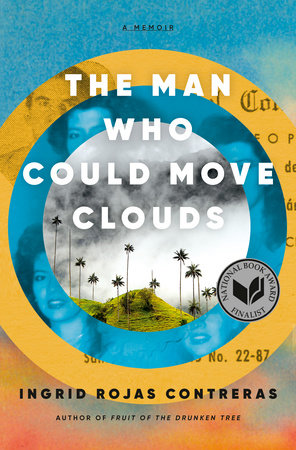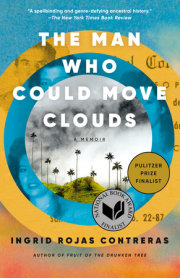1
The Secrets
They say the accident that left me with temporary amnesia is my inheritance. No house or piece of land or chest of letters, just a few weeks of oblivion.
Mami had temporary amnesia as well, except: where she was eight years old, I was twenty-three. Where she fell down an empty well, I crashed my bicycle into an opening car door. Where she nearly bled to death in Ocaña, Colombia, in darkness, thirty feet below the earth, I got to my feet seemingly unharmed and wandered around Chicago on a sunny winter afternoon. Where she didn’t know who she was for eight months, I couldn’t remember who I was for eight weeks.
They say the amnesias were a door to gifts we were supposed to have, which Mami’s father, Nono, neglected to pass.
Nono was a curandero. His gifts were instructions for talking to the dead, telling the future, healing the ill, and moving the clouds. We were a brown people, mestizo. European men had arrived on the continent and violated Indigenous women, and that was our origin: neither Native or Spanish, but a wound. We called the gifts secrets. In the mountains of Santander, the fathers had passed the secrets to the sons, who passed the secrets to the sons, who passed the secrets to the sons. But none of his sons, Nono said, had the testículos required to be a real curandero. Only Mami, strong-willed, unafraid, more of a man than most men in his eyes, whom he liked to call mi animal de monte, could have housed the gifts. But Mami was a woman, and such things were forbidden. If a woman came to possess the secrets, it was said that misfortune would soon follow.
Yet, as eight-year-old Mami recovered from her injuries after falling down the well, and as her memories returned, it so happened that, from wherever her mind had gone, she brought back the ability to see ghosts and hear disembodied voices.
The family says Mami was destined for the secrets, and since Nono couldn’t teach them to her, the secrets had come directly to her.
Four decades later, when I suffered my accident and lost my memory, the family was thrilled. Tías poured drinks, told one another with an air of festivity: There it goes again! The snake biting its own tail!
And then they waited to see how, exactly, the secrets would manifest in me.
This is a story that happens in Spanish, where Mami and the tías call each other vos, the archaic “thou,” but they use tú with me, the informal, tender “you.” Theirs is the way of speaking in Ocaña, where our family is from, and where language can sound like a colonial fossil. In Spanish, our stories are slow then fast, and we cackle, constantly.
Mami and I are spooked by the way our lives echo each other’s, so we don’t often discuss our amnesias. But, increasingly, this is an itch I must scratch. I scrape and scald at its touch, only to want to probe into it again.
The tías ask me to tell them what it was like to live without a memory. I focus on trying to communicate how surreal it was, how cinematic. The tías roll their eyes at me, but they do so while looking at one another, like I am a bad television show they are watching and can safely comment on. Such a gringa this one, no? What they really want to know is what I dreamt.
For Mami and for me, during our bouts of amnesia, our waking lives were punctuated by a constant state of confusion—but our dreams were grounding. Mami’s dreams were sequential, and in her dreams she was a ghost. In mine, I had no body, and as I say this to the tías out loud, I realize: I, too, believed I was a ghost.
We have a word in Spanish for the walking of the dead—desandar. To un-walk. To walk until the walking is worn thin, to walk until the walking undoes even itself. That ghosts have a particular way of walking is an idea we inherited from the settlers who invaded the continent, but what is intrinsically ours is the sense of porosity, an understanding that we live between the real and unreal, and that often they are one and the same. So, to us, the living go on ghost walks too.
The Indigenous peoples of the state of Santander, where both my parents are from, dreamt of the beasts they were to hunt the following day. At daybreak, they left and looked for their dream sight.
Dreams are important for us too.
Forty-three years apart, during each of our amnesias, Mami and I dreamt of banishment.
Mami was a village ghost. The villagers of the place where she was stuck spoke a language she did not recognize but could nonetheless understand. They worshipped her corpse, unrotting and fragrant, and therefore miraculous.
I haunted a horizon of ocean where sometimes the waves withdrew, abandoning the land, and bared the seafloor. Sometimes the land glitched and the ocean was suddenly replaced, as if it had never gone. The waves shuddered then, coughing up lava and smoke, birthing islands.
When Nono was treating an illness, he asked his dreams to guide him to the herbs he needed, and when he roused from sleep, he hiked until the landscape matched his vision, and there he gathered the medicine. When Mami was a ghost in the dream village where she was stuck, she practiced communicating with the living, and once she recovered her memory and became grounded in her waking life, she knew how to speak to the dead. I observed land being born in my dreams, and, awake, I studied with attention as the self I was becoming created itself.
I wonder if—since my life echoes Mami’s, which in turn echoes Nono’s—all of us are on the same ghost walk, retracing and undoing one another’s lives.
The tías interrupt my thoughts. They’ve asked a question, but I haven’t been listening. They ask again whether my post-amnesia dreams are prognostic in nature. In the long seconds before I answer, they look upon me with fear and hope. They know the secrets to be a blessing, but also a burden. They’ve witnessed that often an intoxication with power attends the secrets, and that this intoxication can upend lives, bring about alcoholism, depression, self-harm. But in spite of what it may mean, their eyes well with what seems like anticipation, and I read in their gaze a desire for it to be true, for me to be the last recipient of the secrets. I entertain, for the briefest of moments, what it would be like to say yes, to be someone like Mami, to whom all come for help and advice. In the end, I shake my head: I cannot see ghosts like Mami could, I do not hear the dead, and the future is hidden from me as much as it ever was.
The tías nod slowly. They look down. Bueno. They pat my hand. I’ve disappointed them. I had the opportunity to receive the secrets, and somehow I’ve squandered it. This is the information they’ve been waiting for, and now that they are in possession of it, they shift their eyes back to Mami, yearning for a different story now, one with death and ghosts and vengeance—but in between looking at me and looking at Mami, they say: Better anyway to be normal. Live your life. You’ll see how quickly you forget, quicker than a witch’s fart.
When I was growing up in Bogotá, Mami kept a fortune-telling business in the attic of our house. At all hours of the day, Mami sat facing her clients, men and women of all stations and class, and told them about their lives. But clients who came looking for her healing, guidance, and advice surprised her with contempt when she introduced herself as a curandera. Supervisors demoted Papi from jobs when they found out what Mami was, excluded them from social gatherings, and men who called themselves friends sexually harassed Mami when they found themselves alone with her. Clients in our own house, after Mami had given them treatment, let their mouths bloat with epithets and refused to pay what they owed. Needing money, Mami allowed their hostility to teach her to call herself a fortune-teller, an occupation that even white, blue-eyed Colombians could take up. This has always been the privilege of being mestizo, to claim proximity to whiteness, even if the cost is a hate directed at half of the self. Mami told herself she was proud of who she was, that she only called herself a fortune-teller for her own safety. In time, though, Mami would drop this last label, too, opting in the end to simply describe herself as someone with an ability to see.
Mami says she lost the gift of seeing ghosts when my sister was born, and the gift of hearing voices when I was born, but in the wake of her decreased power, she retained the ability to foretell the future, as well as the eerie yet modest talent of appearing in two places at once.
Throughout my youth, once or twice a month, Mami’s old lovers, close friends, sisters and brothers called to report her visitations. While Mami was at home in Bogotá, her apparition sprang up all over Colombia: knocking on doors in Medellín, shuffling down hallways in Cartagena, tossing strands of black hair in Cúcuta, vanishing into thin air from one moment to the next. Mami celebrated each account. Instead of apparitions, she called her doubles clones. Mami often asked after her clones—what they had been wearing, what hairstyle they had chosen, where their eyes had seemed to alight.
As soon as Mami hung up, her eyes clouded in a dark and mesmerizing defiance. I’ll tell you what, though, she’d say, if someone ever made a real clone of me—I think I would kill her.
Whenever I’ve met Mami’s old friends and lovers, they look at me like they’ve seen a ghost, and I, specifically, am that ghost.
I can’t get over it, it’s like a time machine.
In my presence, Mami’s old lovers slip into a past unknown to me. After polite small talk, they seem to forget who I am. They pull out my chair, hold my hand, gaze into my eyes like they are in love with me. Mami’s old friends, for their part, gossip about acquaintances I’ve never met and expect quick-witted commentary I do not have.
They all look from Mami to me, unbelieving, over a meal or a drink. It’s not that the apple didn’t fall far from the tree, it’s that you had a copying machine, a childhood friend says to us. Mami shows the whites of her eyes, shakes her head, and recoils, all in one gesture, then says, Don’t even tell me. I laugh and sip my drink.
At random moments when Mami is visiting me in California and I am going about my day, playing music, dancing, applying lipstick, drinking wine or tea, Mami will throw books at me, pillows, magazines, whatever is near. Get away from me, you clone!
It’s true that Mami and I have the same thick brows, almond skin, dark, chaotic hair—but I think the gaze of our eyes is different. Where Mami’s is hard and imposing, my gaze is gentle, open, and inquisitive. There is also the matter of the moles. Mami and I have the same moles on our bodies. One rests, small and dark, at the upper inner thigh, and the other is hard to see. It sits enshrouded beneath hairs right at the arch of our vulvas. What do these mean, these markings? Mami once called them constellations, maps that proved we belonged to the same place in the sky.
There’s another mole we share. It is circular, the diameter of a pencil eraser, dark brown. Except, on our shoulders, it is switched: hers sits on her left shoulder, the same circular fleck as mine on the right. Mami and I, we could stand back to back and demonstrate the symmetry of the dot, how it falls at the same length down and in from the shoulder, how the size corresponds one to the other, how faithfully the color is mirrored.
But because it’s on the wrong shoulder on me, I cannot help feeling like a bad copy, like there was a glitch in the machine the moment I was made.
Guerrilla and drug violence drove my family and me from Colombia in 1998, when I was fourteen. This bred a waste of assimilation in my sister and me. Sometimes I imagine: had there been nothing to drive us from our land, had I, in 2007, lost my memory under Mami’s roof in Bogotá instead of in Chicago, to which I immigrated alone, I might have received the secrets in the way the tías implied I should. Maybe I would have started to hear and see the dead like Mami, and, in time, appear in two places at once. Mami might have passed me on the landing one day in our house in Bogotá, and after ascending the flight of stairs would be surprised to encounter me again, upright in the middle of her consulting room in the attic, materialized, a column of air.
But we fled. We had to remake our lives. We didn’t know at the time that the safety we sought had a cost. We didn’t know that this cost would be a gulf—that we would stand before this gulf over and over again and mourn all we’d lost.
Right after my accident, when I picked myself up from the street, new and without a memory, I was overwhelmed by the haunting feeling of having just laid a physical burden down.
Forgetting everything, entirely, was freedom. Amnesia was abundance. The hours lengthened into a certain timelessness, during which a ray of sunlight, never experienced before, was crowned in gold. I forgot myself. On my knees, I followed the ray of light as it cut across my apartment. I stared at the spot where the light met the dark, and in a second I’d rename it: border, grace. Everything was new. My daily labor was the act of naming. I raged with a happiness I have not since and will never again feel.
As my memory returned, piece by piece, I grieved. If amnesia was weightlessness, then the opposite was true: every path taken, every word said, every knowledge discovered, every emotion lived—all of it—came back to me with a manifest weight. The narrowing of a life is gravity. Memory is burden. I mourned every ounce of memory returned.
By the end of eight weeks, when I finally relearned all the details of who I was, I lost myself in the wonder of it. I recalled the stories of Nono and Mami, as well as one small moment: Mami holding my hand over a bowl of water, teaching me how to bless it. In my memory of this moment, I am not listening, choosing instead to be captivated by how our hands—if I ignored the tiny detail of my fingers, a hair’s breadth longer than hers—looked exactly like twins.
Copyright © 2022 by Ingrid Rojas Contreras. All rights reserved. No part of this excerpt may be reproduced or reprinted without permission in writing from the publisher.








